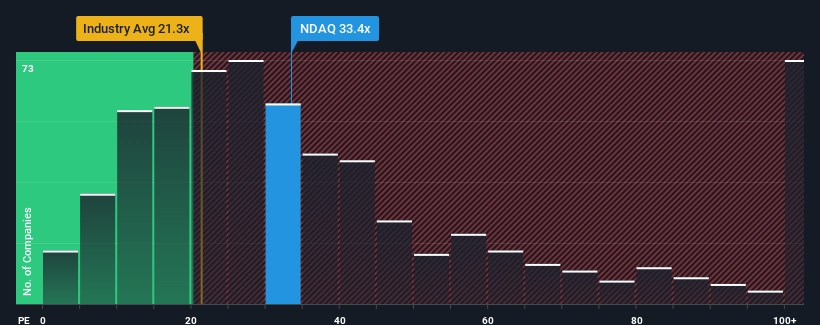- United States
- /
- Capital Markets
- /
- NasdaqGS:NDAQ
Nasdaq, Inc.'s (NASDAQ:NDAQ) Business Is Trailing The Market But Its Shares Aren't

When close to half the companies in the United States have price-to-earnings ratios (or "P/E's") below 17x, you may consider Nasdaq, Inc. (NASDAQ:NDAQ) as a stock to avoid entirely with its 33.4x P/E ratio. Although, it's not wise to just take the P/E at face value as there may be an explanation why it's so lofty.
Recent times haven't been advantageous for Nasdaq as its earnings have been falling quicker than most other companies. It might be that many expect the dismal earnings performance to recover substantially, which has kept the P/E from collapsing. If not, then existing shareholders may be very nervous about the viability of the share price.
View our latest analysis for Nasdaq

What Are Growth Metrics Telling Us About The High P/E?
Nasdaq's P/E ratio would be typical for a company that's expected to deliver very strong growth, and importantly, perform much better than the market.
Retrospectively, the last year delivered a frustrating 8.2% decrease to the company's bottom line. This means it has also seen a slide in earnings over the longer-term as EPS is down 3.4% in total over the last three years. Therefore, it's fair to say the earnings growth recently has been undesirable for the company.
Shifting to the future, estimates from the analysts covering the company suggest earnings should grow by 11% per annum over the next three years. Meanwhile, the rest of the market is forecast to expand by 10% per annum, which is not materially different.
With this information, we find it interesting that Nasdaq is trading at a high P/E compared to the market. It seems most investors are ignoring the fairly average growth expectations and are willing to pay up for exposure to the stock. Although, additional gains will be difficult to achieve as this level of earnings growth is likely to weigh down the share price eventually.
The Key Takeaway
Generally, our preference is to limit the use of the price-to-earnings ratio to establishing what the market thinks about the overall health of a company.
We've established that Nasdaq currently trades on a higher than expected P/E since its forecast growth is only in line with the wider market. When we see an average earnings outlook with market-like growth, we suspect the share price is at risk of declining, sending the high P/E lower. Unless these conditions improve, it's challenging to accept these prices as being reasonable.
You should always think about risks. Case in point, we've spotted 2 warning signs for Nasdaq you should be aware of, and 1 of them is potentially serious.
You might be able to find a better investment than Nasdaq. If you want a selection of possible candidates, check out this free list of interesting companies that trade on a low P/E (but have proven they can grow earnings).
If you're looking to trade Nasdaq, open an account with the lowest-cost platform trusted by professionals, Interactive Brokers.
With clients in over 200 countries and territories, and access to 160 markets, IBKR lets you trade stocks, options, futures, forex, bonds and funds from a single integrated account.
Enjoy no hidden fees, no account minimums, and FX conversion rates as low as 0.03%, far better than what most brokers offer.
Sponsored ContentValuation is complex, but we're here to simplify it.
Discover if Nasdaq might be undervalued or overvalued with our detailed analysis, featuring fair value estimates, potential risks, dividends, insider trades, and its financial condition.
Access Free AnalysisHave feedback on this article? Concerned about the content? Get in touch with us directly. Alternatively, email editorial-team (at) simplywallst.com.
This article by Simply Wall St is general in nature. We provide commentary based on historical data and analyst forecasts only using an unbiased methodology and our articles are not intended to be financial advice. It does not constitute a recommendation to buy or sell any stock, and does not take account of your objectives, or your financial situation. We aim to bring you long-term focused analysis driven by fundamental data. Note that our analysis may not factor in the latest price-sensitive company announcements or qualitative material. Simply Wall St has no position in any stocks mentioned.
About NasdaqGS:NDAQ
Nasdaq
Operates as a technology company that serves capital markets and other industries worldwide.
Average dividend payer with acceptable track record.

